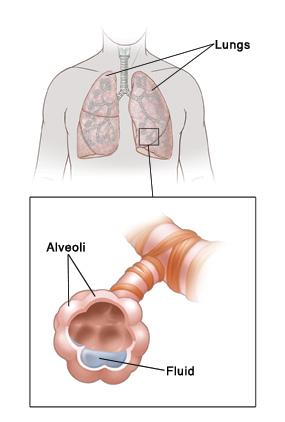Pulmonary Edema
Your healthcare provider has told you that you have pulmonary edema. Read on to learn more about this condition and how it can be treated.
What is pulmonary edema?
Pulmonary edema is caused by excess fluids in your lungs. It occurs when the air sacs (alveoli) in your lungs fill with fluid. The fluid buildup makes it hard for the lungs to do their job, including getting oxygen from the air you breathe and moving it through the body. This makes it hard to breathe. Pulmonary edema can happen suddenly, or it may develop slowly over time.
The most common cause of pulmonary edema is heart failure. When the heart isn't able to pump efficiently, it can cause pressure to rise in the veins (blood vessels) of the lungs. As pressure builds, fluid leaks out of the congested veins. It fills the alveoli. The extra fluid prevents oxygen from moving through the lungs as it should. But heart failure isn’t the only cause of pulmonary edema. Damage to the lungs or kidney failure can also cause fluid to fill the lungs. And in some cases, living or exercising at high altitudes can lead to fluid buildup in the lungs.
 |
| Pulmonary edema is fluid in the air sacs (alveoli) in the lungs. |
How is pulmonary edema diagnosed?
Your healthcare provider does an exam and asks about your health history. You may also have 1 or more of these:
-
Blood tests. These are done to check for abnormalities, help rule out other problems, and determine blood oxygen levels.
-
Imaging tests. These tests take detailed pictures inside the body. They may include a chest X-ray and ultrasound.
-
Electrocardiography (ECG) and echocardiogram. These are done to test how well the heart is working.
How is pulmonary edema treated?
Treatment depends on what’s causing the edema. For instance, if it’s because of heart failure, treating the heart condition will help treat the edema. Treatment can also ease symptoms. Therapy often includes the following:
-
Oxygen. This may be given through a mask that goes over the nose. It may be given through a small tube that sits under the nose. Sometimes pressurized air will be needed through a tight-fitting mask, using a machine called CPAP or BiPAP. Or it may be given through a tube placed into the windpipe (trachea). If a tube is needed, a breathing machine (ventilator or respirator) will be used.
-
Medicines. These may include water pills (diuretics) to help your body get rid of extra fluid by promoting extra urine output. You may also need medicines to treat the heart. These can help your heart pump more efficiently. This helps reduce fluid buildup in the lungs.
What are the long-term concerns?
If treated right away, pulmonary edema can be improved and hopefully resolved. In some cases, ongoing treatment is needed to help prevent and control the problem. This may require having procedures or taking medicines for months or years. In some cases, you may need to use oxygen or breathing equipment for a long time. This can lead to complications, such as damage to lung tissue. Your provider can explain your treatment and management options.
Call 911
Call 911 if any of these occur:
-
Chest pain or chest tightness
-
Feeling of doom
-
Wheezing that doesn't improve or get better with treatment
-
Shortness of breath that doesn't improve or get better with treatment
-
Severe trouble breathing and a feeling that you are suffocating
-
Coughing up blood
-
Skin turns blue, purple, or gray
-
Can't speak full sentences before running out of breath
-
Feeling faint, dizzy, or loss of consciousness
-
Confusion
When to call your healthcare provider
Call your provider right away if you have any of these:
-
Abnormal, fast, or irregular heartbeat
-
Increasing anxiety, restlessness
-
Change in color of your sputum
-
Sweating more than normal
-
Wheezing
-
Shortness of breath
-
Leg swelling between your knee and your ankle
Online Medical Reviewer:
Heather M Trevino BSN RNC
Online Medical Reviewer:
Marianne Fraser MSN RN
Online Medical Reviewer:
Sravani Chintapalli
Date Last Reviewed:
4/1/2024
© 2000-2024 The StayWell Company, LLC. All rights reserved. This information is not intended as a substitute for professional medical care. Always follow your healthcare professional's instructions.